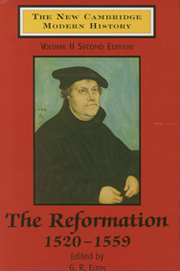Book contents
- Frontmatter
- Introduction to the second edition
- Chapter I The age of the Reformation
- Chapter II Economic change
- Chapter III The reformation movements in Germany
- Chapter IV The Reformation in Zurich, Strassburg and Geneva
- Chapter V The Anabaptists and the sects
- Chapter VI The Reformation in Scandinavia and the Baltic
- Chapter VII Politics and the institutionalisation of reform in Germany
- Chapter VIII Poland, Bohemia and Hungary
- Chapter IX The Reformation in France, 1515–1559
- Chapter X The Reformation in England
- Chapter XI Italy and the papacy
- Chapter XII The new orders
- Chapter XIII The empire of Charles V in Europe
- Chapter XIV The Habsburg–Valois wars
- Chapter XV Intellectual tendencies
- Chapter XVI Schools and universities
- Chapter XVII Constitutional development and political thought in western Europe
- Chapter XVIII Constitutional development and political thought in the Holy Roman Empire
- Chapter XIX Constitutional development and political thought in eastern Europe
- Chapter XX Armies, navies and the art of war
- Chapter XXI The Ottoman empire 1520–1566
- Chapter XXII Russia, 1462–1584
- Chapter XXIII The New World, 1521–1580
- Chapter XXIV Europe and the East
- Index
- References
Chapter X - The Reformation in England
Published online by Cambridge University Press: 28 March 2008
- Frontmatter
- Introduction to the second edition
- Chapter I The age of the Reformation
- Chapter II Economic change
- Chapter III The reformation movements in Germany
- Chapter IV The Reformation in Zurich, Strassburg and Geneva
- Chapter V The Anabaptists and the sects
- Chapter VI The Reformation in Scandinavia and the Baltic
- Chapter VII Politics and the institutionalisation of reform in Germany
- Chapter VIII Poland, Bohemia and Hungary
- Chapter IX The Reformation in France, 1515–1559
- Chapter X The Reformation in England
- Chapter XI Italy and the papacy
- Chapter XII The new orders
- Chapter XIII The empire of Charles V in Europe
- Chapter XIV The Habsburg–Valois wars
- Chapter XV Intellectual tendencies
- Chapter XVI Schools and universities
- Chapter XVII Constitutional development and political thought in western Europe
- Chapter XVIII Constitutional development and political thought in the Holy Roman Empire
- Chapter XIX Constitutional development and political thought in eastern Europe
- Chapter XX Armies, navies and the art of war
- Chapter XXI The Ottoman empire 1520–1566
- Chapter XXII Russia, 1462–1584
- Chapter XXIII The New World, 1521–1580
- Chapter XXIV Europe and the East
- Index
- References
Summary
England, as is notorious, wore her Reformation with a difference. While elsewhere a religious upheaval carried in its wake political and constitutional reconstruction, England’s march away from Rome was led by the government for reasons which had little to do with religion or faith. There are of course circumstances, feelings and passions, as well as indifferences which explain the English Reformation. The dislike of priests and the pretensions of the church, which appeared all over western Europe, had not left England untouched. A whole folklore of the disreputable cleric testifies to a common opinion whose significance is quite independent of its accuracy. The abuses of the church – simony, nepotism, pluralism, ostentatious wealth, corruption, worldliness – gave pause to good orthodox Christians like Thomas More who only started to deny them when denunciation had become linked with heresy. Since 1515, Thomas Wolsey, the great cardinal, had governed church and state and had given a concrete and comprehensive example of all that was wrong with the former. Like his master, the pope, he had done the work of this world and paid merely formal attention to the work of the next. The extenuating circumstances which later ages may discover – his buildings, his patronage of the arts and learning, his tolerance – seemed to his own age only to aggravate his unashamed worldliness. There were truer Christians among the English clergy than Wolsey, but both in high places and in low, among the bishops and in the parishes, the not-so-spiritual greatly outnumbered the rest.
- Type
- Chapter
- Information
- The New Cambridge Modern History , pp. 262 - 287Publisher: Cambridge University PressPrint publication year: 1990
References
- 1
- Cited by



